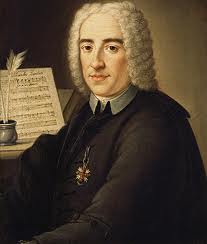April 29, 2013.Alessandro Scarlatti.These days Scarlatti-père is not as famous as his son Domenico, but in his day Alessandro was the foremost opera composer.He was born in Palermo, the Kingdom of Sicily, on May 2, 1660.At the age of 12 he was sent to Rome.He wrote his first opera at the age of 19; Queen Christina of Sweden, who then lived in Rome, was impressed and offered her patronage.His work was noticed in Naples, at that time one of the greatest music centers of Europe, and in 1684 he became Maestro di Cappella to the viceroy of Naples.He stayed there till 1702 and wrote 40 operas.For a while he moved to Florence but then returned to Rome, where he was offered a position of Maestro di Cappella at the court of Cardinal Pietro Ottoboni (just some years earlier Arcangelo Corelli had the same patrons, Queen Christina and Cardinal Ottoboni).While in the employ of the Cardinal, he wrote several operas, including Il Mitridate Eupatore, which became very popular (here is the aria Cara tomba sung by the German coloratura soprano Simone Kermes).In 1706 Scarlatti was elected to the Accademia dell'Arcadia (as was Corelli).There he probably met the young Handel, who then lived in Rome and attended meetings of the Academy often.In 1709 Scarlatti moved back to Naples, where he continued to write at a furious pace: operas (he wrote a total 115 of them), masses and chamber cantatas.He retired from the viceroy’s court in 1723 and died two years later, on October 24, 1725.
By the end of his life Scarlatti’s operas were eclipsed by Handel; not many of them are performed these days, although lately there has been somewhat of a revival.Still, not only did Scarlatti write some very lovely music, he was an innovator as well: for his operas he established a form of three-part overture, a forerunner of the classical symphony.You can listen to two arias from Scarlatti’s early operas.Beniamino Gigli, one of the greatest tenors of the 20th century, sings the aria "Già il sole dal Gange" from L'honestà negli amori (the opera was written in 1680).And here the technically perfect Cecilia Bartoli sings the aria O cessate di piagarmi from the opera Il Pompeo (1683).
Alessandro Scarlatti 2013
April 29, 2013. Alessandro Scarlatti. These days Scarlatti-père is not as famous as his son Domenico, but in his day Alessandro was the foremost opera composer. He was born in Palermo, the Kingdom of Sicily, on May 2, 1660. At the age of 12 he was sent to Rome. He wrote his first opera at the age of 19; Queen Christina of Sweden, who then lived in Rome, was impressed and offered her patronage. His work was noticed in Naples, at that time one of the greatest music centers of Europe, and in 1684 he became Maestro di Cappella to the viceroy of Naples. He stayed there till 1702 and wrote 40 operas. For a while he moved to Florence but then returned to Rome, where he was offered a position of Maestro di Cappella at the court of Cardinal Pietro Ottoboni (just some years earlier Arcangelo Corelli had the same patrons, Queen Christina and Cardinal Ottoboni). While in the employ of the Cardinal, he wrote several operas, including Il Mitridate Eupatore, which became very popular (here is the aria Cara tomba sung by the German coloratura soprano Simone Kermes). In 1706 Scarlatti was elected to the Accademia dell'Arcadia (as was Corelli). There he probably met the young Handel, who then lived in Rome and attended meetings of the Academy often. In 1709 Scarlatti moved back to Naples, where he continued to write at a furious pace: operas (he wrote a total 115 of them), masses and chamber cantatas. He retired from the viceroy’s court in 1723 and died two years later, on October 24, 1725.
He was born in Palermo, the Kingdom of Sicily, on May 2, 1660. At the age of 12 he was sent to Rome. He wrote his first opera at the age of 19; Queen Christina of Sweden, who then lived in Rome, was impressed and offered her patronage. His work was noticed in Naples, at that time one of the greatest music centers of Europe, and in 1684 he became Maestro di Cappella to the viceroy of Naples. He stayed there till 1702 and wrote 40 operas. For a while he moved to Florence but then returned to Rome, where he was offered a position of Maestro di Cappella at the court of Cardinal Pietro Ottoboni (just some years earlier Arcangelo Corelli had the same patrons, Queen Christina and Cardinal Ottoboni). While in the employ of the Cardinal, he wrote several operas, including Il Mitridate Eupatore, which became very popular (here is the aria Cara tomba sung by the German coloratura soprano Simone Kermes). In 1706 Scarlatti was elected to the Accademia dell'Arcadia (as was Corelli). There he probably met the young Handel, who then lived in Rome and attended meetings of the Academy often. In 1709 Scarlatti moved back to Naples, where he continued to write at a furious pace: operas (he wrote a total 115 of them), masses and chamber cantatas. He retired from the viceroy’s court in 1723 and died two years later, on October 24, 1725.
By the end of his life Scarlatti’s operas were eclipsed by Handel; not many of them are performed these days, although lately there has been somewhat of a revival. Still, not only did Scarlatti write some very lovely music, he was an innovator as well: for his operas he established a form of three-part overture, a forerunner of the classical symphony. You can listen to two arias from Scarlatti’s early operas. Beniamino Gigli, one of the greatest tenors of the 20th century, sings the aria "Già il sole dal Gange" from L'honestà negli amori (the opera was written in 1680). And here the technically perfect Cecilia Bartoli sings the aria O cessate di piagarmi from the opera Il Pompeo (1683).